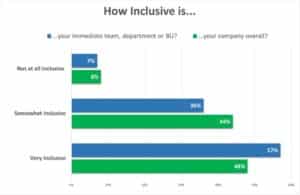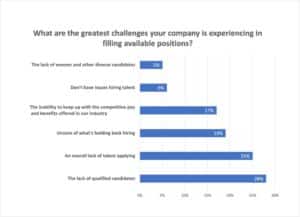There’s no disputing that as an industry, commercial real estate lags in terms of diversity, equity and representation. It’s also undeniable that industry leaders have taken great measures over the past decade to catch up. Despite this, there’s plenty of room for improvement—especially for companies looking to retain and maintain a diverse, productive and satisfied workforce.
When it comes to DEI policies, it’s important to look beyond mere quotas and ratios. In other words, these issues can’t be fixed by simply hiring more employees from diverse backgrounds. Rather than focusing on just hiring, companies must dedicate their resources and efforts to retaining, fostering and promoting employees of all backgrounds. If not, the very workers they worked hard to attract will ultimately end up leaving.
Indeed, a just-released paper from Gartner notes how employee expectations have shifted going into 2023. More than half of employees polled want their organizations to take actions on issues they care about, and 82 percent feel that it’s important for their organization to see them as a person, not just as an employee.
The workforce of today wants employers to pay more than just lip service to DEI efforts; they want these initiatives engrained into the fabric of the company. Three-quarters of workers and job applicants view a diverse workforce as important when considering companies and job offers, as per CREW Network. A full 37 percent would skip applying for a job altogether if the business didn’t have satisfactory ratings among people of color.

MANAGEMENT MATTERS
Global nonprofit think tank Coqual investigated the role individuals play in making equity a reality in the workplace. It found that many employees, especially members of marginalized groups, experience unfair treatment because of their identity. The firm found that nearly one in three Black professionals feel they’re treated unfairly because of their race; one in five women feel they’re treated unfairly based on gender; and more than one in six LGBTQ professionals feel they’re treated unfairly because of their sexual orientation.
What’s more, both Black and Latinx professionals are aware of the negative stereotypes they face in the workplace, making mistakes even more of a concern. The study finds that 29 percent of Black and 22 percent of Latinx professionals worry about how their mistakes might reflect on others who look like them, compared to 13 percent of white professionals.
While some may decry these employees’ opinions as being sensitive or “woke,” the implications of that approach are far-reaching. Coqual’s analysts point out that inclusive behavior is contagious, spreading down from managers to colleagues. Having a more inclusive manager and colleagues is associated with an 18 percent and 21 percent increase, respectively, in perceptions of fairness at work. Perceptions of fairness often affect important business outcomes, such as an employee’s trust in their company and their intent to stay. People don’t stay where they don’t feel wanted or valued.

According to Deloitte’s Women @ Work 2022 Global Outlook, women working for companies that foster genuine inclusive cultures report very high levels of engagement, career satisfaction and trust—indicating they would stay with their employers longer as a result. The same sentiment is echoed in studies of employees from minority backgrounds and younger generations.
The benefits of having leadership on board with DEI initiatives have been proven time and again. A 2022 Hiring Outlook from the Tandym Group showed that 91 percent of employees feel the actions of executive leadership affect company culture, but over a third say their leaders aren’t as engaged, as transparent nor as accessible as they should be. Gartner’s study also reported 36 percent of HR leaders admit that they have a hard time holding executives accountable for DEI outcomes.
One of the main hitches, they say, is the lack of diversity in the leadership pipeline. In its study of thousands of global companies, Gartner found that women and minorities respectfully account for just 29 percent and 17 percent of the C-suite. Distribution is a little better among middle-management, where women and racial minorities account for 41 percent and 25 percent of roles.
A new Korn Ferry analysis of the 1,000 largest U.S. corporations across eight industries reported that although about 45 percent of all employees are women, representation declines the higher you go up the corporate ladder. Women now comprise a quarter of the C-suite, a mere two percentage point increase from five years ago.
The distribution of roles also varies greatly. The only C-suite role where women dominate (holding 55 percent of positions) is that of Chief HR Officer. This was followed by Chief Marketing Officer, which saw the biggest five-year increase of all C-suite roles, from 32 percent to 36 percent. Women also accounted for 15 percent of CIO/CTO and 12 percent of CFO roles. Just six percent of Chief Executive Officer seats were held by women, and that figure hasn’t changed in half a decade.
In the male-dominated commercial real estate field, it’s easy to imagine those numbers being even lower.
NEXT WEEK: The Way Forward




